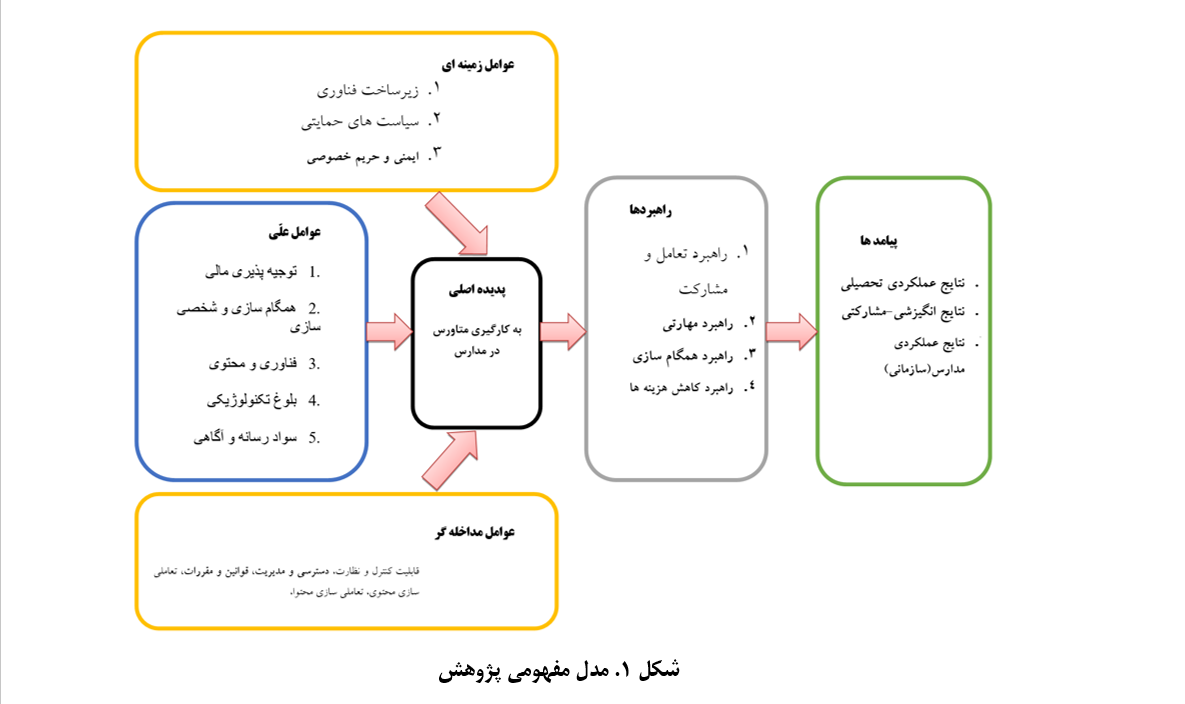Validation of the Metaverse Model in Science Education for Middle School Students
Keywords:
Metaverse, Structural Equation Modeling, Science Education, Causal Factors, Outcomes, StrategiesAbstract
The objective of this study was to validate the metaverse model in science education for middle schools and identify its influencing factors, strategies, and outcomes. This quantitative, survey-based study was conducted with a statistical population comprising teachers and principals of middle schools in Tehran during the 2023-2024 academic year. A sample of 265 participants was selected using the Morgan table. Data were collected using a researcher-made questionnaire with 43 items on a five-point Likert scale. Structural equation modeling (SEM) was applied to analyze the data using AMOS software. Model fit indices, including RMSEA, GFI, CFI, and chi-square/df, were used to assess the model’s quality. The results revealed that causal factors, such as technological infrastructure, content, and media literacy; intervening factors, such as management and supervision; and contextual factors, such as supportive policies, security, and privacy, significantly influenced the adoption and implementation of the metaverse. Effective strategies identified included interaction and participation, skill-building, synchronization, and cost reduction. The outcomes of the model included improved academic performance of students, increased motivation and participation, and enhanced organizational performance of schools. The model fit indices indicated a good model quality (RMSEA=0.075, CFI=0.979). The integration of the metaverse in science education can enhance the quality of learning, boost student and teacher engagement, and reduce educational costs. Successful implementation requires strengthening infrastructure, developing supportive policies, and training teachers.
Downloads
References
Zhang L. Online Learning With Metaverse for History Education at Primary School Education Level. International
Journal of Academic Research in Progressive Education and Development. 2024;13(2).
Zhang X, Chen YC, Hu L, Wang Y. The Metaverse in Education: Definition, Framework, Features, Potential
Applications, Challenges, and Future Research Topics. Frontiers in Psychology. 2022;13.
Zaidi SSB. Metaverse-Powered Basic Sciences Medical Education: Bridging the Gaps for Lower Middle-Income
Countries. Annals of Medicine. 2024;56(1).
Ahmadon F. Game On: Designing and Analysing an RPG Educational Game for Compilers Algorithm Understanding
in the Metaverse. International Journal of Academic Research in Progressive Education and Development. 2023;12(3).
Sim JK. Designing an Educational Metaverse: A Case Study of NTUniverse. Applied Sciences. 2024;14(6):2559.
Jafari E. The Outlook of Learning Through Metaverse Technology From the Perspective of Teachers in the Science
Education. Research in Learning Technology. 2023;31.
Azoury N, Hajj C. Perspective Chapter: The Metaverse for Education. 2023.
Chamola V. Metaverse for Education: Developments, Challenges and Future Direction. 2023.
Kaddoura S, Husseiny FA. The Rising Trend of Metaverse in Education: Challenges, Opportunities, and Ethical
Considerations. Peerj Computer Science. 2023;9:e1252.
Dreamson N, Park G. Metaverse‐Based Learning Through Children's School Space Design. International Journal of
Art & Design Education. 2023;42(1):125-38.
Almurtadha Y. Utilizing the Metaverse in Astrosociology: Examine Students' Perspectives of Space Science
Education. International Journal of Advanced Computer Science and Applications. 2024;15(3).
Lee J, Lee TS, Lee S, Jang J, Yoo S, Choi Y, Park YR. Development and Application of a Metaverse-Based Social
Skills Training Program for Children With Autism Spectrum Disorder to Improve Social Interaction: Protocol for a
Randomized Controlled Trial. JMIR Res Protoc. 2022;11(6):e35960.
Seifi E, Ahmadi A, Moazzami M. Identifying the dimensions and components of the application of new technologies
in the fourth generation university. Management and Educational Perspective. 2024;5(4):24-51.
Rane N. Leading-Edge Metaverse in Education: Framework, Applications, Challenges, and Future Development.
Tesol and Technology Studies. 2024;5(2).
Saphira HV. Metaverse: A Paradigm Shift in STEM Education for Science Learning Beyond the Review. E3s Web
of Conferences. 2024;482:04004.
Pregowska A. What Will the Education of the Future Look Like? How Have Metaverse and Extended Reality Affected
the Higher Education Systems? Metaverse Basic and Applied Research. 2023;3:57.

Downloads
Published
Submitted
Revised
Accepted
Issue
Section
License
Copyright (c) 2025 Journal of Study and Innovation in Education and Development

This work is licensed under a Creative Commons Attribution-NonCommercial 4.0 International License.










